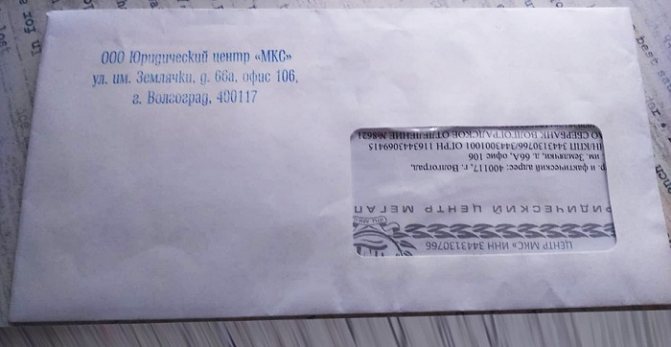What to do first?
Please read it carefully first. It is very important here to determine whether these are specifically your debts on bank loans or whether the letters are addressed to another person to whom you have no relation. Remember if a close friend asked you to act as his guarantor or if you had to take out a small loan at the request of an acquaintance.
This must be done because the algorithm of actions if you receive letters from debt collectors addressed to another person and what to do when you are the borrower are slightly different.
In any case, dial the number written on the paper and clarify all the information. Don’t let employees intimidate you from the very first minute; the law is on your side in any case, even if you are overdue.
Next, you need to call the creditor bank and find out whether the debt was resold to a collection agency. If the letter is an accident, then restructuring issues can be discussed, otherwise everything is a little more serious.
Then we take the letter and go to a lawyer, who will explain the important points and tell you what to do next. If you receive letters from collectors, in principle you should not communicate with them, especially if you have no idea what they want from you and do not know the debtor.
When the debt is yours, we examine the sheet again for phone numbers, the name of the organization, and carefully check the seal - is it wet or is it just a sheet printed on a printer? Without outgoing data, stamps and telephone numbers, this letter cannot be considered an official document, which means it has no legal force.
Often the signature and seal are simply reproduced on a color printer. We conclude that the collectors’ goal at this stage is only to intimidate you.
I received a letter about the visit of collectors
Advice from lawyers:
1. I received a letter about a debt collector’s visit to my house, debt 30,000 thousand, can they come?
1.1. They may come, but you may not let them in and send you back from where you came.
Did the answer help you?YesNo
1.2. It's a scam, they won't come, and you shouldn't let anyone in. You will invite the riot police to tea on this day.
Did the answer help you?YesNo
Consultation on your issue
8
Calls from landlines and mobiles are free throughout Russia
2. I received a letter about the upcoming visit of field inspectors from Everest LLC. My father took out the loan, my family and I knew absolutely nothing about the loan, my father has not lived in the apartment with us for a long time, but has a share, what can the collectors do and can they come home?
2.1. Greetings. They can come, but they have no right to enter the apartment. Call the police immediately.
Did the answer help you?YesNo
3. Debt to the microfinance organization (I paid small sums, the money went nowhere), the case was transferred to collectors. Is it possible to negotiate with Col. agency to pay the debt in installments or wait for the court? I received a letter from the collectors with a date for a visit to my home.
3.1. Good evening! You have the right not to allow debt collectors into your apartment. Often, in case of debt on microloans, they offer various options for paying off the debt, for example, to pay a certain part of the amount before a specific date, the remaining part is “forgiven”, you can agree to these conditions, but it is necessary to ensure that this procedure is completed correctly. If you do not pay the debt and do not contact the collection agency, then there is a chance that the statute of limitations will be missed. If, nevertheless, the CA manages to go to court, then you will have the right to submit objections to the CA’s demands.
Did the answer help you?YesNo
3.2. It’s better for you not to pay anything to the collectors, and in court you can ask for an installment plan.
Did the answer help you?YesNo
4. For six months it was not possible to pay by credit card Otp. I received a letter from collectors stating that a visit is planned in a week to identify and inspect the property. Is this visit possible and can they sue with this amount of debt?
4.1. Hello. Only bailiffs can make an inventory of property on the basis of a court decision that has entered into force. Collectors do not have such rights, nor do they have the right to inspect your property. Regarding the possibility of filing a claim in court: if you do not pay the loan, the creditor has the right to file a claim in court to collect the debt, and the size of the debt does not matter.
Did the answer help you?YesNo
5. I received a letter from the collection agency Creditexpress Finance that I have a debt of 8,000, the letter states: On October 28, 2016, there will be a visit from representatives of the LLC “Regional Collection Service” in order for the bailiffs to describe the inventory and valuation of the property.” Well, all sorts of scary pictures... Please tell me. Who should notify me about the arrival of bailiffs - collectors or bailiffs? So what should I expect?
5.1. You and the collectors did not enter into any agreements, and your civil legal relations are only with the creditor. The creditor did not make any claims against you, nor did he warn you in writing that he had assigned the right to claim the debt to another company. Do not pay attention to calls and letters from collectors; if they become very annoying and annoying, file a statement with the police that people unknown to you are calling and writing to you and extorting money, ask them to take measures to identify these persons and bring them to justice . Write that you did not give creditors the right to process and distribute your personal data. In general, collection firms do not operate within the legal framework; their task is to extract money from debtors and use it for their own purposes. It is not a fact that having agreed to pay them one day, they will send the money to pay off the debt to the creditor to whom you owe, and they will not call tomorrow that your debt has increased and you already owe a much larger amount, their appetites are growing. Collectors do not have the right to collect debt amounts, much less inform you about the arrival of bailiffs. If I have fully answered your question, I am happy to help you! You can use the services of a website lawyer to solve your problems.
Did the answer help you?YesNo
6. Our relative took a micro loan and did not pay it for half a year, until we received a letter at our registration address about a visit from collectors (we ourselves did not know that he took money there). What should we do now? He doesn’t live here, but they will come here at his registration address. As I understand it, we will be forced to pay his deputy?
6.1. No, you are not obliged to pay his deputy, you have the right not to let collectors in. And call the police.
Did the answer help you?YesNo
6.2. Hello! Nobody will force you to pay someone else's debt. If they arrive at your registration address, call 02 immediately. If they call and bother you, contact the police.
Did the answer help you?YesNo
6.3. Hello! Nobody will force you to do anything if you were not a guarantor. Without a bailiff, you can prevent debt collectors from entering your apartment.
Did the answer help you?YesNo
6.4. You will not be forced to pay for someone else's deputy. Collectors only have the right to negotiate for debt repayment. They do not have the right to describe the property. So explain that your relative is not at home.
Did the answer help you?YesNo
7. My husband died, I was the guarantor. Several ships have passed and I have nothing to pay. Letters from collectors began to arrive, I explained the situation, that I had not entered into the inheritance, I was not involved in his business, I was sitting at home raising my children, and now I am sitting at home with my youngest child, a letter arrived addressed to my husband about a visit. What to do? It scares me.
7.1. If the letter about the visit is from collectors, then if they come, you can safely call the police.
Did the answer help you?YesNo
7.2. Urgently to the bank. Carry a death certificate (copy) and write a statement that you did not enter into an inheritance.
Did the answer help you?YesNo
7.3. Good afternoon Write to the organization who sent the letter stating that the husband has died and attach a copy of the death certificate. Do not communicate with debt collectors outside of court. If they start “visiting” you, call the police. If there are threats, record conversations with a voice recorder.
Did the answer help you?YesNo
8. I owe the bank 30 thousand, I received a letter about a visit from collectors, can I pay off the amount in installments?
8.1. Contact your bank. You can repay in installments.
Did the answer help you?YesNo
9. I received a notification about the visit. From CreditExpress Finance LLC, in case of non-payment of your debt under the loan agreement dated January 18, 2012, they will come and describe the property. I was not notified that the bank sold me to a collector and I paid the bank through an ATM according to the agreement that was specified when applying for the loan and no one called me or received a letter telling me not to pay under this agreement.
9.1. Only bailiffs have the right to describe property based on a court decision. You have the right not to let debt collectors in.
Did the answer help you?YesNo
10. In 2008, I took out a loan (card) from Jeans Money Bank. For reasons independent of me, the last payment was in 2009. The last time we communicated with the bank. By phone in April 2010. Then there were a couple of letters from collectors, and the last couple of years there has been silence, although the debt has not been fully repaid. Now I have received a letter from Credit Express Finance LLC about a visit to inspect the property. I’m ready to pay off the debt, but slowly and it’s not clear to whom. And the statute of limitations has passed. Now I don’t know what to do.
10.1. The statute of limitations has passed, there is no point in paying.
Did the answer help you?YesNo
10.2. Tell those who call and write everything. That according to Article 196 of the Civil Code of the Russian Federation you are not obligated to pay anything to anyone; according to the Labor Code, the statute of limitations of three years has passed.
Did the answer help you?YesNo
11. I receive letters about debt to the bank using someone else’s name, a person I don’t know! I also received a notification about a visit from collectors on the same occasion, the notification says that they can seize the property of this person unknown to me, as well as third parties... Can I be recognized as a third party (allegedly a friend, relative, mistress...) of this person and describe my property ?
11.1. Good afternoon. Only bailiffs can “describe” property if there is an instituted execution. Proceedings based on a court decision that has entered into legal force. Court decision and execution Proceedings must be exclusively in relation to the debtor and NO third party is liable for his debts (unless there is a surety agreement). Therefore, feel free to leave everyone who comes to you with claims at your doorstep. In case of threats, insults and attempts to enter your apartment, immediately call the police.
Did the answer help you?YesNo
12. Recently, letters of claim about the repayment of loan debt from several banks began to arrive at my address. The loans are not mine, the borrower’s name is not me. Some lady unknown to me, who apparently indicated the address at random. The letters contain threats about visits from collectors and bailiffs, that they will come to describe the property, etc. I understand that this has nothing to do with me. But how can I get rid of these banks so that they don’t bother me with letters?
12.1. Write a claim to the banks and a complaint to the Central Bank of the Russian Federation.
Did the answer help you?YesNo
13. I took out a loan for a small business. I paid part of it, but now due to lack of business and being on maternity leave I can’t pay. I received a letter from the collectors of Credit Express Bank stating that they would come on a visit to evaluate the property. Tell me what to do? There is no way to pay at the moment.
13.1. If they don’t come, they don’t have the right, but if they do, call the police.
Did the answer help you?YesNo
13.2. Compose and send a letter to the collectors... The letter must be legally motivated. It must be said that without obtaining your consent, the bank did not have the right to assign the rights of a creditor to a collection organization that does not have a license to carry out lending activities, unless, of course, your loan agreement with the bank provides for the possibility of assignment without obtaining your consent (clause 51 of the Resolution Plenum of the Supreme Court of the Russian Federation dated June 28, 2012 No. 17). Most likely, there is no such clause in your agreement with the bank; accordingly, the transfer of the right of claim to collectors is initially invalid due to its nullity. Accordingly, the actions of collectors as new creditors go beyond the law. Here you need to carefully study your loan agreement and all accompanying documents, and based on the results of the study, find out whether the bank had the right, WITHOUT YOUR CONSENT, to make an assignment to a collection organization that does not have a license to carry out banking activities. This is only a small part of what I can answer you...
Did the answer help you?YesNo
Consultation on your issue
8
Calls from landlines and mobiles are free throughout Russia
14. I received a letter from the collectors stating that in case of non-payment of the debt, representatives of the enforcement department are planning a visit to the place of residence to identify and inspect the property, as well as determine the possibilities for its further sale by the bailiffs, as a result of a court decision. But I did not receive any court decision. What does this mean for me?
14.1. Collectors do not have any rights to inventory property; you don’t have to let them into your home.
Did the answer help you?YesNo
15. I received a letter about a visit from a specialist from Creditexpress, but the fact is that the borrower died in 2014, I am the owner of the apartment, the borrower was registered with me before his death, was discharged upon death, I did not enter into the inheritance, I explained everything to the collectors. But they still call and send letters. Can you please tell me what to do. Thank you. Natalia.
15.1. Nothing to do! The main thing is, don’t communicate with collectors anymore, change phone numbers if necessary. If they don't stop, contact the police.
Did the answer help you?YesNo
16. A notification has been received regarding a visit to inspect the property for an unpaid loan. The letter threatens to sue. But they must be summoned to court if the case is transferred there? How to deal with these collectors? Will they legally pay a visit?
16.1. They won’t; their actions in this case should be regarded as extortion. You shouldn’t talk to them, cut them off and send them to court.
Did the answer help you?YesNo
17. Recently, we began to receive letters from collection agencies about collecting a debt from a person who has never lived at our address. We called and talked about it. Today I received a letter about a visit from collectors. What should we do?
17.1. According to the Law of the Russian Federation dated 02/07/1992 N 2300-1 “On the Protection of Consumer Rights,” the assignment of rights of claims to collectors is prohibited, unless otherwise provided by the loan agreement. If you are threatened by debt collectors, then you need to contact the police with a written statement of extortion in accordance with Article 163 of the Criminal Code of the Russian Federation.
Did the answer help you?YesNo
18. I received a letter by email in which I was notified that debt collectors were coming to my home. Moreover, the time of the visit is indicated from 18.00-20.00 Moscow time. Is this legal?
18.1. Sergey, good evening! They can come, you have the right not to wait for them and not to open the door for anyone. They will call and they will leave. All the best,
Did the answer help you?YesNo
Reasons for letters
So, there is a debt and what to do if you receive letters from collectors? We contact the central office of your creditor bank and find out whether there was an agreement to resell the debt to a collection agency.
In any case, you have the right to receive a copy of such agreement. Based on this information, you can understand that you still owe the bank, and the collectors are just a fiction, or they are now acting as buyers of the problem debt and you only need to deal with them.
The second important point is how much exactly does it cost to pay? Collectors can easily add several thousand more to the debt, supposedly for their services, calling it penalties. They have no legal basis for this; any court will side with the borrower and cancel these markups.
But first, you should get a certificate from the bank that clearly states the amount of debt with all explanations.
On what basis do you receive letters from debt collectors?
The legislation allows such methods of influence of collectors on debtors as sending emails and postal correspondence at their place of residence (location). Compared to other methods, the methods of communicating with debtors described above are subject to less stringent requirements. For this reason, such enforcement measures are very popular among collectors.
Unlike personal meetings and telephone conversations, correspondence does not involve direct contact and direct interaction with the debtor. This explains the fact that there are no strict requirements for sending letters (both postal and electronic).
The law provides for two types of correspondence, each of which is considered independent:
- messages via telecommunication networks (telegrams, SMS, etc.);
- postal items - this category includes any letters that are sent by collectors via regular and electronic mail.
The rules and requirements for conducting correspondence are the same regardless of how it is carried out:
1. The addressee of the letters must be the debtor, and not third parties. Otherwise, this is possible only with the written consent of the borrower and only on the condition that third parties do not disagree with the receipt of correspondence.
2. Unlike other methods of interaction with the debtor, there are no requirements for postal correspondence (including e-mail) regarding the number of messages and the time of their sending. Collectors have every right to independently determine how many letters to send and when. The exception is text, telegraph and other messages sent via telecommunications. There are clear regulations regarding them. Such notifications can be sent no more than 2 times a day, 4 times a week and 16 times a month. It is prohibited to disturb the debtor on weekdays from 22:00 to 8:00, and on weekends from 20:00 to 9:00.

3. Postal letters, including electronic ones, must contain the following information:
- information about the creditor and collector acting in his interests (for individuals and entrepreneurs this is full name and OGRN, for organizations - legal address, OGRN, INN), as well as their contact details (telephone, address, email) and documents confirming their authority ;
- Full name and position of the person who signed the letter;
- size and structure of debt;
- procedure and terms of debt repayment;
- information about the agreement and other documents establishing the borrower’s obligations;
- Bank account details for transferring the debt amount.
4. The text of letters and application documents must be clear and readable. All correspondence should be conducted in Russian.
5. Messages must not insult the debtor, threaten him, humiliate his honor and dignity, or mislead him regarding his rights and obligations.

According to the law, the debtor does not have the right to refuse such a method of interaction with the collector as mail correspondence or to limit his actions by sending a statement about the need to correspond exclusively through a lawyer. All these rules apply only to telegraphic, text and other messages sent over telecommunication networks.
Who should I pay and should I pay at all?
As a rule, people get scared and don’t know what to do when they receive a letter from debt collectors. Some try to pay off the debt using the specified details, but under no circumstances should this be done. The reason is simple - according to the law, since the debtor agrees with part of the debt, then he agrees with the entire amount.
Thus, any ruble that you deposit into the agency’s account is an agreement with the debt. Moreover, a simple piece of paper without a wet stamp is not a basis for making payments.
Anyone can forge such a certificate, but it is almost impossible to prove that it came from debt collectors.
There is one more trick: on the paper they will indicate to you the amount of debt of 50 thousand, but in fact there has long been 100 thousand, but you have already agreed with the amount of debt. In such a situation, the law will not help; the amount of debt should have been checked in advance. Therefore, we do not recommend paying in the following situations:
- you do not agree with the prescribed amount of debt;
- collectors have no legal basis on which they can demand repayment of the debt;
- the letter has no legal force.
How and where to complain?
Innovations in the legislative framework have created conditions for citizens who believe that their rights have been violated to change the situation for their personal benefit.
Borrowers should contact:
- to the regional branch of the FSSP;
- Roskomnadzor;
- the prosecutor's office;
- police;
- court.
At the same time, an appeal to the four first instances does not require the applicant to collect evidence, but everywhere he will have to write a statement. It must also refer to articles of law, indicate the circumstances of the case and list evidence. Appeals are drawn up in accordance with the requirements of Art. 131 and 132 Code of Civil Procedure.
Application samples:
Completed sample complaint to the prosecutor's office about the actions of debt collectors
Completed sample complaint to Roskomnadzor
Cases vary. It is possible that some will cause skepticism, for example, from the police, but will be of interest to bailiffs. Therefore, try to complain to all possible structures at once.
Reply or ignore?
Are you wondering what to do if debt collectors have sent you a letter and whether you should respond to it? There are a couple of possible options here too. Any word you say can be used against you in the future, so you need to answer if you are able to write a letter correctly and legally.
It would be best to send them back a copy of a certificate stating that you have no debt or simply ignore the letters. The main thing is don’t panic!
The size of your current debt cannot increase several times, but if there was no debt at all, it will not be pinned on you. But just in case, it makes sense to get legal advice.








